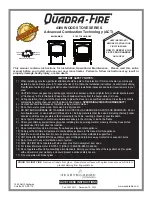
8
3.4 Flue Connection
3.4.1. General Notes
This appliance may be installed with a roof terminal (C31) or a wall terminal (C11).
This appliance may only be used with Balanced Flue (otherwise known as Concentric Flue) parts as specified by
Wanders. The Wanders specified flue parts have been approved with the appliance. If the appliance is installed
on non-Wanders approved parts, Wanders cannot guarantee or accept and responsibility for the proper and safe
working of the appliance.
The flue system must be constructed from the appliance upwards, with all joints being fully locked and sealed
using the Wanders specified parts. Flue systems approved for this Appliance:
• Muelink & Grol (M&G) Concentric.
• Poujoulat PGI.
• Metaloterm US.
3.4.2 Timber Frame Construction
Whilst it is possible to install room-sealed appliances in timber frame properties, great care needs to be taken to
ensure that the flue assembly does not interfere with the weather proofing qualities of any outer wall which it
may penetrate. Before attempting this work, further details need to be referenced, (e.g. “Gas Installations in Timber
Frame Buildings” from the CORGI installer series in the UK).
3.4.3 Carport or Building Extension
Where a flue terminal is sited within a carport or building extension, it should have at least two completely open
and unobstructed sides. The distance between the lowest part of the roof and the top of the terminal should be
at least 600mm.
Note: A covered passageway should not be treated as a carport. Flues should not be sited in a covered passageway
between properties.
3.4.4 Basements, Lightwells and Retaining walls
Flue terminals should not be sited within the confines of a basement area, light well or external space formed by a
retaining wall, unless steps are taken to ensure the products of combustion can disperse safely at all times. It may
be possible to install this Balanced Flue system in such a location provided that it is not sited lower than 1m from
the top level of that area to allow combustion products to disperse safely.
Flue terminals should be sited to ensure total clearance of the combustion products in accordance with the
included information.
When the products of combustion are discharged, they should not cause a nuisance to adjoining or adjacent
properties and they should be positioned so that damage cannot occur to other parts of the building. If the outer
wall surface is constructed of combustible material, a non-combustible plate should be fitted behind the terminal
projecting 25mm beyond the external edges of the terminal.









































